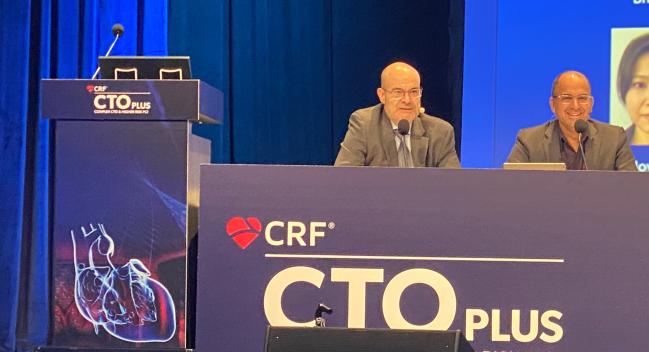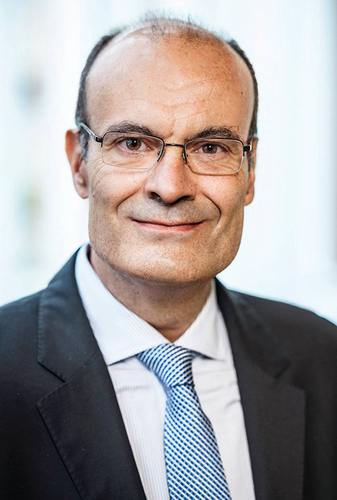Dimitrios Karmpaliotis, Master Operator and Mentor With ‘Heart of Gold,’ Dies at 53
Karmpaliotis leaves behind a legacy of teaching his profound skills in complex PCI and his passion for patients and family.

Photo Credit: Columbia CHIP Fellows
Dimitrios Karmpaliotis, MD, PhD (Morristown Medical Center, NJ), an interventional cardiologist known for his expertise in the field of complex PCI, died suddenly at home yesterday at age 53. News of his death was confirmed by colleagues today.
Karmpaliotis was an early pioneer in treating chronic total occlusions (CTO)—both training fellows in one of the first dedicated fellowship programs in the United States and serving as the backbone for the Cardiovascular Research Foundation’s annual CTO Plus conference. His death is a devastating loss for the field, with colleagues and mentees reflecting on not only his clinical excellence and technical skills but also his caring, persistent nature and willingness to teach.
“He was my beacon when I didn’t know who to turn to when I had tough cases or when I needed advice and counseling,” former fellow Raja Hatem, MD (Hôpital du Sacré-Coeur de Montréal, Université de Montréal, Canada), told TCTMD. “He taught me everything I know about CTO and complex PCI. Every case I do, I think about him.”
“He is one of the most technically accomplished people we've ever seen in our field,” Ajay J. Kirtane, MD, SM (NewYork-Presbyterian Hospital/Columbia University Irving Medical Center, New York, NY), said, adding that he knew Karmpaliotis from his fellowship days and was thrilled to get to work with him again when he moved to New York in 2014.
“Dimitri was also one of the most passionate and intensely loyal friends I’ve ever known—a true gem of a person and so giving,” Kirtane added. “When he came to Columbia, our program vaulted to a totally different level and every one of our operators got better through his tireless efforts.”
Gregg Stone, MD (Icahn School of Medicine at Mount Sinai, New York, NY), echoed those sentiments.
“Since Geoff Hartzler, Dimitri was the most skilled and expert operator I’ve ever seen,” Stone said. “His passion for interventional cardiology and his patients was unmatched. He was a huge personality, larger than life, and devoted to his loving family. His loss at this young age is absolutely heartbreaking.”
Martin Leon, MD (NewYork-Presbyterian/Columbia University Irving Medical Center, New York, NY), too, likened Karmpaliotis to several of the founding physicians in the field of interventional cardiology. “Dimitri was a towering figure: a gifted intuitive interventionalist in the tradition of Gruentzig, Hartzler, and Cribier," he told TCTMD. "His perseverance and relentless pursuit of excellence was inspiring. We will dearly miss his indomitable spirit, mentoring, and special friendship.”
I genuinely believe he was an artist in the cath lab. Amirali Masoumi
Colleague Amirali Masoumi, MD (Morristown Medical Center), told TCTMD that Karmpaliotis was a “visionary in terms of complex coronary procedures. I mean, talented—extremely talented—and always thriving for perfection.”
Karmpaliotis was “the one that began CHIP education,” said Sanjog Kalra, MD (Toronto General Hospital, Canada), the first fellow to train in complex high-risk indicated PCI with him. “The concept was crystallized, but it was his idea of turning it into a teachable, trainable paradigm,” Kalra said, noting that Karmpaliotis had to “fight the naysayers when they said it’s impossible to teach a young operator a senior grab bag of tricks.”
‘Tireless Ball of Energy’
Born in Greece, Karmpaliotis studied medicine at the University of Athens School of Health Sciences and moved to the US to train in internal medicine at Brown University School of Medicine (Providence, RI). He went on to train in critical care and pulmonary medicine at Massachusetts General Hospital and Brigham and Women’s Hospital and then decided to change paths to pursue cardiology at Beth Israel Deaconess Medical Center (all affiliated with Harvard Medical School, Boston, MA). Karmpaliotis completed his fellowship in interventional cardiology at Emory University (Atlanta, GA).

Following training, he joined the faculty at Piedmont Heart Institute (Atlanta, GA), where he helped build its prestigious interventional cardiology program. He moved to NewYork-Presbyterian/Columbia University Irving Medical Center (New York, NY), in 2014 to serve as the director of its Chronic Total Occlusions, Complex and High-Risk Angioplasty Program. In 2021, he moved to Morristown Medical Center to serve as medical director of the Cardiovascular Rescue and Recovery Program and the Advanced Coronary Therapeutics and Chronic Total Occlusions Program. He had plans to return to Atlanta later this year to lead the interventional program at Piedmont.
David Kandzari, MD (Piedmont Heart Institute), who met Karmpaliotis 20 years ago while doing device testing in Australia, told TCTMD he was excited to soon have his friend back as a colleague. Working with him was “probably the best cath lab experience we had ever had,” he said. “Everybody’s work elevated each other. We were very supportive of the work that each other were doing, and we together advanced our skillsets in doing complex coronary intervention and then teaching it to people throughout the world. And really, it was because of Dimitri’s talents.”
In everything he did, Karmpaliotis was a “tireless ball of energy,” Kandzari added.
William Lombardi, MD (University of Washington Medical Center, Seattle), recalled Karmpaliotis’ initial fervent interest in learning to treat CTO lesions and being inspired to help him succeed.
“His legacy is that with hard work and determination, you can achieve greatness,” Lombardi said. “He worked hard, he practiced hard, he got coached well, and he then got into a position where he could pass on those behaviors and the technical skills to those behind him. His legacy is [being] a great teacher and someone who always wanted to see and help people get better at their jobs.”
Megha Prasad, MD (NewYork-Presbyterian/Columbia University Irving Medical Center, New York, NY), who trained in complex interventions under Karmpaliotis, was impressed most by his generosity, both with his skills and his time.
“Dimitri strived to be excellent,” she told TCTMD. “Not only was he an amazing operator, but he was attentive, he was committed, he was dedicated, and he really was very open about his journey to becoming a master in his craft. I think a lot of people gained a lot of inspiration from that. Whether you were in the coronary field or not, you could just see somebody that really tried to be better every day at what they did and tried to learn from the day before and improve.”
Additionally, Prasad added, Karmpaliotis had a “heart of gold” and was dedicated to both his patients and colleagues as well as his family. “I’ll forever be indebted to him for the profound impact he had on my own journey as both an operator, a physician, and a parent,” she said, recalling him going “above and beyond” when she was pregnant with her first child. “I think it really spoke to who he was.”
Several other colleagues remarked on his caring nature, including William Nicholson, MD (Emory University, Atlanta, GA), who served as an intern and interventional fellow with Karmpaliotis and remained close with him over the years. “He had the biggest heart and would do anything for anybody,” he told TCTMD. “He came off a lot of times abrasive, but he was anything but that for real as the person he was. Really, he was just a tremendous friend.”
The connection he had with his trainees “was a very, very personal bond,” Kalra told TCTMD. “It was a sense of devotion to a common goal, and through that sense of devotion, you found family in one another. He wasn’t just a doctor we worked with, he was our family, and I would’ve done anything for him.”
While Karmpaliotis’ “strong, brash” exterior meant “you never had to guess where you stood with him, once you broke through that layer and he made you his own, you saw a side of him that I think few got to see. [It] was very loving, very caring,” Kalra continued. “Those of us who got to see that were deeply, deeply privileged to do so.”
He is one of the most technically accomplished people we've ever seen in our field. Ajay Kirtane
“You’d do anything for [him] just because of the way he was,” said Nicholson. He was also “much more” than only an interventionalist, he added, noting his “incredible knowledge of classical music, art, history, and philosophy. He was maybe the smartest person I’ve ever met.”
Masoumi, too, remembered how in tune Karmpaliotis was with both music and art, and commented how that likely contributed to his professional success. “I genuinely believe he was an artist in the cath lab,” he said. “The way everything was harmonious, the way he was working, as if he was playing piano. I’ve learned to always have that attention to detail and precision and harmony when I perform.”
‘Time Flies’
In a 2023 podcast interview with Emmanouil S. Brilakis, MD, PhD (Minneapolis Heart Institute and Minneapolis Heart Institute Foundation, MN), Karmpaliotis spoke of his love of the classics, especially Plato and Thucydides. “Not because I’m Greek,” he clarified. “It’s just because they just have defined everything in the world that we live in.”
During the same interview, he spoke to how his work in complex PCI along with others created “a school” and altered the foundation of how interventional cardiology is practiced today. “We changed the way interventionalists interact with each other,” he said. “It stopped at some point being an individual sport, so to speak, and became a team sport.”
While he took pride in the fellows he trained over the years and the programs that he built, Karmpaliotis was proudest of his family, namely his wife Ioanna Kosmidou, MD, and their son Alkis. “We tend to forget and time flies,” he told Brilakis. “And if you get too deep involved in advanced PCI and CTOs and you travel around the world and you publish and you’re so busy every day, you miss a lot of things from everyday life and you cannot bring time back.”
“The goal isn’t perfection, but continual evolution,” Alkis Karmpaliotis said in a recent commencement speech. “To be a work-in-progress, even if, at times, you don’t know where the road ahead is leading you, means you’ll always have somewhere to go and something to live for.”
Yael L. Maxwell is Senior Medical Journalist for TCTMD and Section Editor of TCTMD's Fellows Forum. She served as the inaugural…
Read Full Bio

Comments